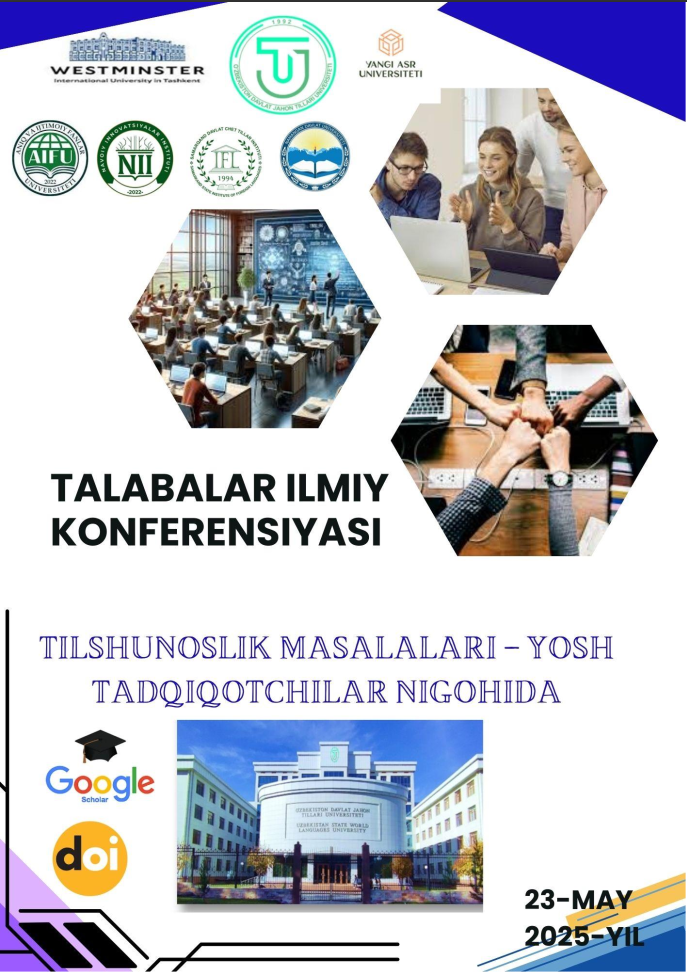THE SOCIOPRAGMATIC DESCRIPTION OF SPEECH IN ENGLISH AND UZBEK DRAMA
https://doi.org/10.5281/zenodo.15517326
Kalit so‘zlar
Sociopragmatics, speech acts, English drama, Uzbek drama, power structures, social identity, gender roles, language and society, Shakespeare, Hamza, modern theatre.Annotasiya
A sociopragmatic analysis of speech in Uzbek and English drama is presented in this article, which looks at how language in these two different linguistic traditions reflects social dynamics, power structures, and cultural standards. The study contrasts the sociopragmatic roles of language in classical and contemporary plays from both English and Uzbek literature by concentrating on the pragmatics of speech acts. The study investigates how language serves as a medium for identity construction, social roles, and power negotiation by drawing on the works of well-known English dramatists like William Shakespeare, Oscar Wilde, and Harold Pinter, as well as traditional Uzbek playwrights like Hamza and Fitrat and current Uzbek theater artists. The article explores how gender and power are conveyed via speech acts and emphasizes the role that speech plays in creating social hierarchies through both formal and informal language usage. It also examines how individual and collective identities are portrayed differently, as well as how the conversation around gender roles in contemporary play is changing. Uzbek drama is more in line with communal values and respect for social hierarchies, whereas English drama frequently emphasizes individualism and the questioning of established norms. According to the analysis, language serves as a vehicle for social transformation and cultural expression in addition to communication, reflecting the changing dynamics of both Uzbek and English cultures.
Foydalanilgan adabiyotlar ro‘yhati
Alimdjanovna, K. M. (2023). DEVELOPMENT OF STUDENTS'CRITICAL THINKING SKILLS IN ENGLISH CLASSES. European International Journal of Multidisciplinary Research and Management Studies, 3(05), 125-127.
Austin, J. L. (1962). How to Do Things with Words. Oxford: Clarendon Press.
Azamova, A., & Erdanova, Z. (2024, May). LINGUISTIC FEATURES AND FUNCTIONS OF COLLOQUIAL WORDS. In Conference Proceedings: Fostering Your Research Spirit (pp. 229-230).
Brown, P., & Levinson, S. (1987). Politeness: Some Universals in Language Usage. Cambridge University Press.
Crystal, D. (1997). The Cambridge Encyclopedia of Language. Cambridge University Press.
Goffman, E. (1967). Interaction Ritual: Essays on Face-to-Face Behavior. Anchor Books.
Gulomova, R. (2023). EVOLUTIONARY HISTORY OF CURSING. Journal of Advanced Scientific Research (ISSN: 0976-9595), 3(12).
Hilola, X. (2025). INNOVATIVE APPROACHES AND ACQUISITION METHODS IN LANGUAGE LEARNING. TANQIDIY NAZAR, TAHLILIY TAFAKKUR VA INNOVATSION G ‘OYALAR, 1(7), 396-398
Kadyrova, G. (2018). Linguocultural Features of Uzbek Speech Etiquette. Tashkent.
Kasimov, Sh. (2005). Adabiyotda til va uslub masalalari. Tashkent: O‘qituvchi.
Kupaysinovna, S. G. (2020). THE ROLE OF ENGLISH TEACHER IN A MODERN CONTEXT. Проблемы науки, (7 (55)), 64-65.
Leech, G. (1983). Principles of Pragmatics. Longman.
Muhtashamova, P. Z. (2019). THE USE OF ICT IN THE ENGLISH CLASS. Наука и образование сегодня, (6-1), 87-89.
Rashidova, G. (2024). USING COMMUNICATIVE ACTIVITIES THROUGH APPROACHES IN TEACHING MODERN ENGLISH. TAMADDUN NURI JURNALI, 5(56), 471-474.
Searle, J. R. (1969). Speech Acts. Cambridge University Press.
Sultonova, M. (2024). The significance of critical thinking in learning languages. O ‘zbekiston davlat jahon tillari universiteti konferensiyalari, 443-446.
Xujaniyazova, H. (2024). YURIDIK RITORIKADA MADANIYATNING AKS ETISHI. TAMADDUN NURI JURNALI, 6(57), 228-230.

